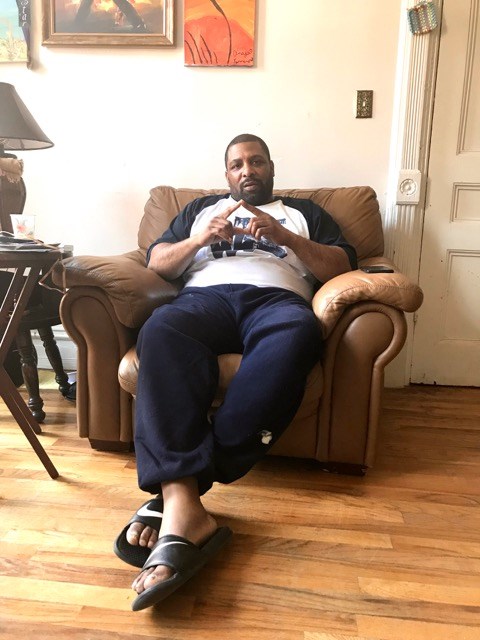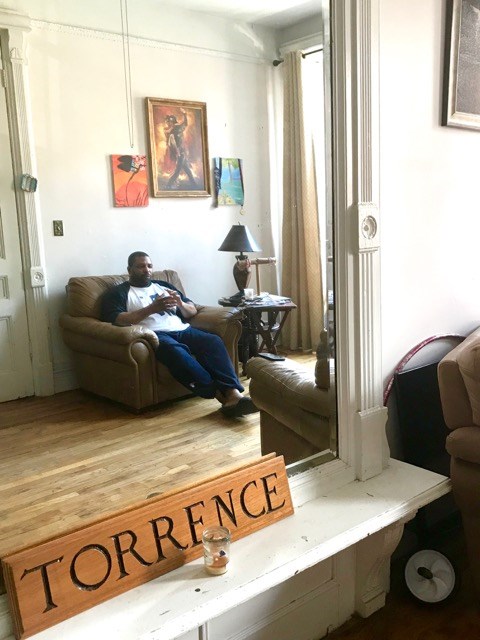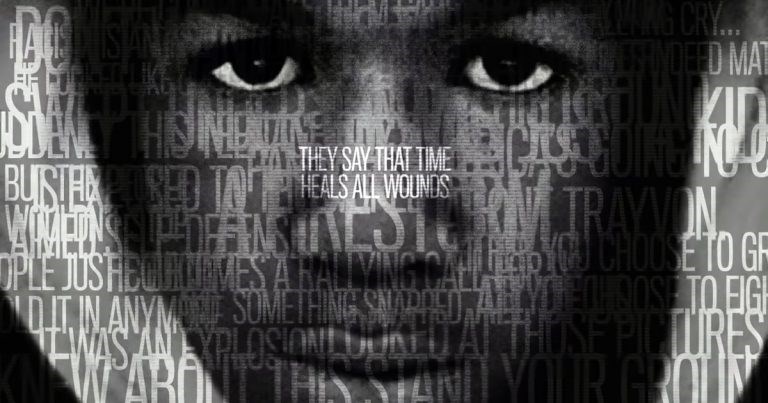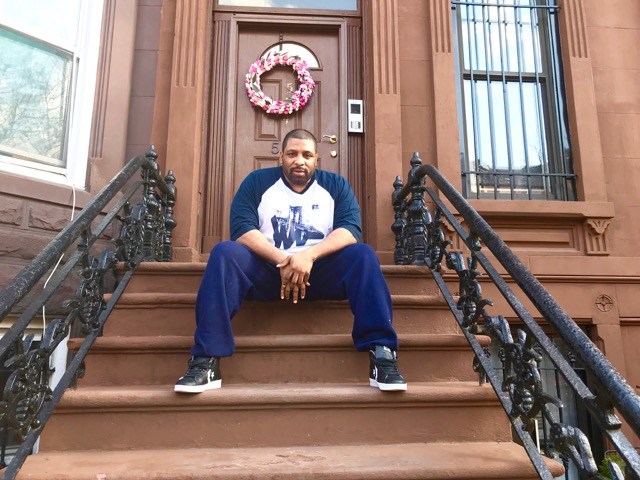Attika J. Torrence had to check with his wife first before agreeing to an interview at his home in Brooklyn-- only because, he "might need to pick up his daughter from school at that time, or she might be getting the floors done," he said. You know, family stuff. Torrence is a family man, an actor, a filmmaker, a writer, a producer and a proud Bed-Stuy resident.
Currently, he's preparing for the release of his latest project where he served as co-producer, Rest in Power: The Trayvon Martin Story, which will debut at the Tribeca Film Festival on Friday, April 20. The six-part docu-series which recounts the life and tragic and untimely death of 17-year-old Trayvon Martin, is executive produced and directed by the same people behind Time: The Kalief Browder Story, another critically acclaimed docu-series for which Torrence also worked.
Torrence sat down with BK Reader for an intimate discussion around the state of filmmaking today; how his experience growing up in Bed-Stuy shaped his lens on life; and why he believes that black people should have the freedom and opportunity to be the author of their own stories.
-----------------------*-----------------------
BK Reader: You've been acting, writing, producing and directing now since the late 90s. In that time, so much has changed as far as the technology available for filmmaking. Describe how this has impacted the industry.

Attika J. Torrence: The industry has grown tremendously. One of the best parts about it is the freedom and license for people to take an idea and turn it into media content, which is a great thing. But that same gift is also a curse, because it has watered down the craft quite a bit; it's watered down the art of filmmaking. You don't really need to learn how to do it and become really good at it. Anybody can now grab a phone and film. It's a great thing on one hand. But it has lowered the entry level, so there's more quantity, but the quality has suffered.
BKR: Your work has premiered at several film festivals, including The Acapulco Film Festival, The American Black Film Festival, and The San Francisco Black Film Festival, to name a few. As a black filmmaker, have you witnessed a sort of growth or evolution in the way black stories are now regarded or told?
AJT: We've been told that our films don't sell internationally and our actors don't sell internationally for years. But the lies that we've been told about black films not selling through the 90s and early 2000s, those lies are now being squashed with films such as Black Panther, which has done phenomenally at the box office. But our films have always made more money per product than other films. If you take a film that you've created for $5 million and it makes $60 million, you've made more money than a film that cost $100 million and made $150 million.
That's what our films have been doing for many years, but now it can't be denied. Yet, the business gatekeepers still say to us, "Yes, it sounds nice, but what if you made it less... ethnic? What if you flipped it to Drew Barrymore in that role?" People are still fighting for their right to tell their stories, even with a proven track record. There are directors and producers that still have to sell the notion, "I want this actor; I want to tell this story; I want to base it in this part of the town. And yes, it will still sell." Despite our successes, we're still having to have those conversations.
BKR: Has this pushback affected your ability to make movies? And if so, how do you manage to push past this?
AJT: I started out wanting to be an actor. But I didn't want to wait for anyone to cast me, so I needed to learn how to direct. So I went back to school. And then I realized, I didn't even want to wait for someone to hire me as a director, so I needed to learn how to write. So filmmaking transitioned from acting. I had a manager, and I remember a colleague of mine was sent out on an audition, and I wasn't. And I asked the manager how come he didn't send me out. The manager said, "Well you know, they're looking for that more mainstream, successful, clean-cut look. And I see you more as rugged " I thought, I could shave and put a tie on. But I knew then that someone else's idea of who I was, was not going to control my destiny or my trajectory. So I knew instantly, I would need to go back to school and learn as much as possible if I was going to control my own destiny.
BKR: You were born and raised in Bedford-Stuyvesant, Brooklyn. How did this neighborhood inform the way you think and work now?
AJT: My family is from Bed-Stuy, but a major chunk of my life, from age 10-16, I grew up in Liberia. I had a great childhood and Liberia was an extension of Bedford Stuyvesant. I've never wanted to live anywhere else in Brooklyn. I'm a Bed-Stuy boy, and there's nothing like it. Every other area to me is missing something, and Bed-Stuy has it all. My parents were founding members of "The East," a pan-African organization, which included a school, Imani Daycare Center and Uhuru Sasa. We lived by the 7 principles of the Nguzo Saba. So, long before Wakanda was a thing, we really lived that in Bedford Stuyvesant, and moving to Liberia was an extension of that.
BKR: Okay, so let's talk about about "Rest in Power: The Trayvon Martin Story," which will be screening this week at the Tribeca Film Festival. How did you get involved?
AJT: I was asked to work on Rest in Power as a field producer, and I initially had some reservations about it, because it's a heavy project, and I wanted to make sure the story was told properly. So I took a moment. But I said yes, because I had some familiarity with the executive producers and directors for Time: The Kalief Browder Story, and I know they genuinely want to tell the best story they can. While on the project, my role was bolstered to a co-producer, which is pretty cool, because I had a lot of input as it related to some of the interviews, questions asked and the edits. That's where I really wanted to be, because ... part of me wanting to do this project was so that I had a voice. I'm not the voice; but I am a voice, and I wanted to make sure this project was told in the most sincere way.
Because even in that extreme sincerity, something can be lacking. So fortunately, my voice was heard, and it made a difference on several levels, not just from the project perspective, but from a marketing perspective. It's been a very interesting journey creating this project. There were moments that were tough, listening to interviews and finding out more and more about what really happened. One of the things that kept me going was knowing that no matter what I'm going through, the parents, the siblings, relatives are going through a lot more. So I just need to park whatever I'm feeling.
BKR: On the subject of storytelling, why do you feel it is so important that black people be involved in telling their own stories?

AJT: Working on Rest in Power, we interviewed people who support George Zimmerman for killing a 17-year-old boy that went walking to the store to buy Skittles and an ice tea. And they're saying, "Well, I hope people will think about this the next time some guy breaks into their home and rapes their wife; I know they're going to hope they have a neighborhood watch person on patrol like George Zimmerman." That's what people are saying. And that had nothing to do with the narrative. So when we deal with storytelling; when we deal with imagery; when we deal with the narrative about us, it's very important that we are at the reigns of the storytelling, because Trayvon Martin or Tamir Rice or Amadou Diallo or Sean Bell, they are all somebody else to the white man behind the gun.
Let me share a story. I own a black SUV. One day, I was driving, it was raining outside. I pulled over to make a phone call. And when I pulled over, three young black men with hoods walked over to my car. And one of them tried to open my door. Then one knocked on the window. I looked out and thought about it. I could have reversed, pulled off. But I rolled my window down instead, and I said, "Whassup?" I said it kind of stern. And he said, "You Uber?" And I said, "Nah, man." Then his friends started laughing, and they said, "Yo, I told you he wasn't the Uber." And then suddenly, they were children with their hoods on because it was raining; children unaware of how society views them. I said to them, "Listen, I know y'all didn't mean no harm, but this is an interesting time we're living in, man. I mean, you need to be careful what car you're walking up on. Make sure I'm the Uber. Use the app that tells you."
But, if I'm the man with the gun, and I'm petrified of those children, that narrative could have turned out differently and would have been told differently. Or I might have panicked, reversed to pull off and possibly hit one of them And the driver's excuse would have been that they tried to get into the car I felt comfortable enough to roll the window down. If my wife was in the car, she might not have felt comfortable, or she might have, who knows? It depends: What world do you live in?

BKR: From an artistic and emotional standpoint what did you hope to achieve from this film? What about those folks-- black and white-- who already know the Trayvon Martin story? For many people, hearing that name brought up again and watching the story retold might seem painful? Why would we want to watch this story retold?
AJT: Let me start by saying this: You don't know the Trayvon Martin story. You think you know the Trayvon Martin story. Let's just start there. There is information out there that is just coming out. This project delves deep into what is going on, why this happened and how we can avoid this from happening again. And I'm so grateful I was a part of this project because there were lapses in the interviews and the story that I was able to see and catch right away, because... this is my culture. Our stories inevitably will be told from a different perspective, if you're not of this culture.
I was watching an investigative news show about a white kid who was convicted for killing his parents and younger sister when he was 17 years old. He was a freshman in college at the time and was caught by his family stealing money from his grandmother. So when his parents found out, he killed them, then took their money and went on vacation and stayed at the Ritz Carlton. The news described him as "a normal kid, the All-American boy, the-boy-next-door..." The narrator said, "You would have never expected this from him." They humanized this kid who was a killer.
Trayvon Martin was never humanized. If he would have gotten hurt or into a fight, he wouldn't have even gone to a regular doctor; he would have gone to a pediatrician. He wasn't an adult yet. He was a teen, and he was well-rounded. He played football. He loved to snowboard. Every summer, he attended aviation camp; he knew how to fly planes. But it's interesting and deep the way our narratives are told. I want people to see the real Trayvon Martin and learn the real story.
I wanted people to see that he was the all-American boy.
-----------------------*----------------------
The first episode of Rest in Power: The Trayvon Martin Story will screen on Friday, April 20, 5:45pm at BMCC Tribeca PAC. To purchase tickets, go here. Following the screening will be an audience talk-back moderated by MSNBC's Joy Reid with co-directors Julia Willoughby Nason and Jenner Furst, the parents of Trayvon Martin, Sybrina Fulton and Tracy Martin, executive producers Jay-Z, Mike Gasparro and Chachi Senior. Rest in Power, the series, will run on the Paramount Network (formerly Spike TV) this summer.




